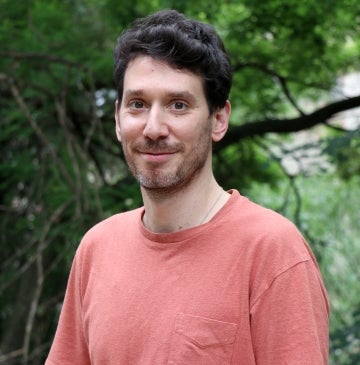The Center for Advanced Research in Global Communication Welcomes New Postdoctoral Fellow
Sima Kokotović will join the Annenberg School in the fall.

The Center for Advanced Research in Global Communication (CARGC) at the Annenberg School for Communication at the University of Pennsylvania is thrilled to announce that film and media scholar Sima Kokotović will join the center this fall as a postdoctoral fellow.
Dr. Kokotović was selected from an incredibly competitive pool of over one hundred applicants from around the world. He will join current CARGC postdoctoral fellows Zehra Husain and Ignatius Suglo, and will play an integral role in co-leading the center's Turning Points: Nonaligned Visions research project with CARGC Senior Research Manager, Eszter Zimanyi.
"Sima's scholarship and teaching move across an astonishing range of media forms, histories, and regional and national contexts. It's exactly the kind of comparative media research we hope to cultivate," says CARGC Director, Aswin Punathambekar. "I can't wait to welcome him to CARGC and Annenberg soon!"
Associate Director Juan Llamas-Rodriguez echoes Punathambekar's sentiments: "Sima brings to CARGC not only a wide-ranging global research agenda but also an impressive background in building collaborative networks between media researchers, practitioners, and activists. I look forward to collaborating with him on our new and ongoing projects."

Kokotović's research examines intersections of global film cultures and leftist politics.
At CARGC, he will undertake two research projects. The first, a book project entitled Cinematic Solidarities: Cinema Amidst Global Vistas of Struggle, builds on his dissertation research where he theorizes the category of cinematic solidarities to describe how filmmakers and film cultural workers devised new modes of political engagement and institutional arrangements in response to a wave of global uprisings during the 2010s. He argues how cinematic solidarities offer an analytic lens that draws attention to and maps cinema’s capacities to partake in networked grassroots politics from below. The second project reconstructs the history of cinematic connections and media projects across the Non-Aligned Movement (NAM), with the focus on Yugoslavia and in the context of the 20th-century decolonization projects.
"I'm excited to be part of CARGC's vibrant community," says Kokotović. "Hopefully, my work on political valences, forgotten histories, and unexpected geographies of global media circulation will productively contribute to the debates fostered at the center."



